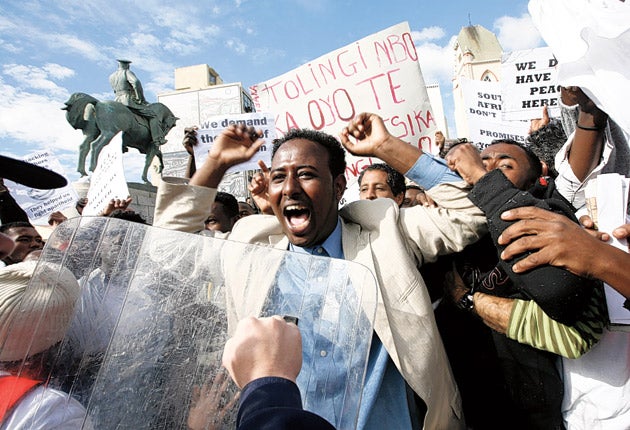South Africa's migrants fear fresh violence

Dozens of people were camped out among their own possessions on the highway out of Cape Town yesterday trying to hitchhike away from the threat of violence.
With only two days to go until the World Cup final and the end of the month-long tournament, South Africa's millions of migrants are living in fear of a return of the wave of xenophobic violence that swept the country two years ago, killing 62 people and displacing tens of thousands more.
So far a number of isolated incidents have not escalated. But refugee and migrant agencies across the country have been warning for months that a co-ordinated whispering campaign threatening attacks on foreign nationals after the World Cup has created a "climate of threat".
Yesterday, the South African government outlined its commitment to protecting foreign nationals with a briefing by its inter-ministerial committee on xenophobia. At the same time, police held emergency meetings with communities in Diepsloot after a series of threats against homes and businesses in the settlement north of Johannesburg.
Earlier this week Reason Wandi, a Zimbabwean national, was thrown by other passengers from a moving train. After the incident, which left him severely injured, he told reporters: "They [passengers] said, 'they must go back home to their countries, makwerekweres'."
Makwerekwere is a pejorative term for black Africans from outside South Africa.
Last week a Somali trader was killed in the sprawling township of Khayelitsha, on the outskirts of Cape Town.
On Wednesday, South African troops and an army helicopter moved into the Ramaphosa informal settlement in the East Rand area outside Johannesburg. This, along with Alexanderville, was one of the townships in which vicious xenophobic violence flared two years ago.
An army spokesman denied that the soldiers were deployed to prevent attacks: "It was normal crime prevention duties. There is no fear of anything."
Miranda Madikane from the Scalabrini Centre for Refugees in Cape Town, who has been interviewing people on the roadside outside the city, said that a significant number of migrants were on the move out of fear of attack.
"People have been planning to leave for a while, they have been frightened since May. They've been told to leave," she said, adding that while migrants are often on the move in search of better conditions, "people are shifting, the threats are real."
The most visible sign of a potential crisis has come on the N1 motorway leading out of Cape Town where about 50 mainly Zimbabwean migrants have gathered in the hope of getting a lift out of the city and across the country to Johannesburg. Many have been camped among their giant plastic holdalls for days.
Among them was Rachel Gatsi, a young woman who had been working on a nearby farm. She said: "Some of them tell us, 'we are going to burn you with tyres'. We are scared. We have to go."
The African Disabled Refugee Organisation estimated that as many as 10,000 people were on the move out of fear of a resumption of attacks. In Johannesburg at the Central Methodist Church which has become a sanctuary for foreign migrants, Paul Verryn said that a steady trickle of foreign nationals had started to arrive looking for a "safe haven". The retired bishop said volunteers were working to set up helplines where attacks or threats could be reported.
"Certainly there are threats. At the moment it's gossip on the buses, in the trains and on the street corners," he said. But he cautioned against exaggerating threats into a crisis.
Mr Verryn has been working with civil society groups to put pressure on the government to protect migrants and be vigilant against organised mob attacks. "We may have human rights in the constitution," he said. "But we have no ethos of human rights."
"This thing is not without cause," he went on. "And if we can talk to the people involved we might be able to deal with their concerns."
Join our commenting forum
Join thought-provoking conversations, follow other Independent readers and see their replies
Comments
Bookmark popover
Removed from bookmarks